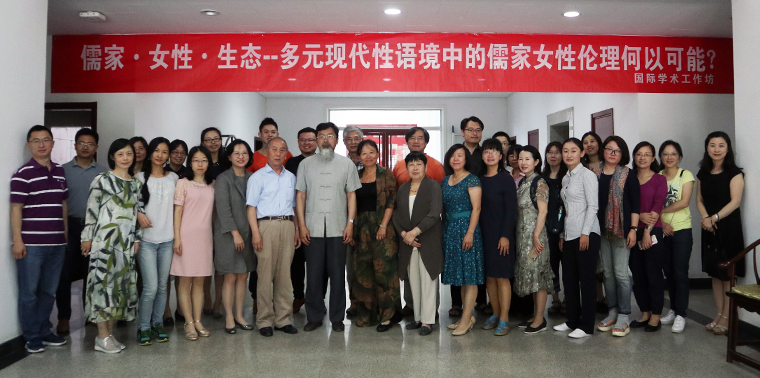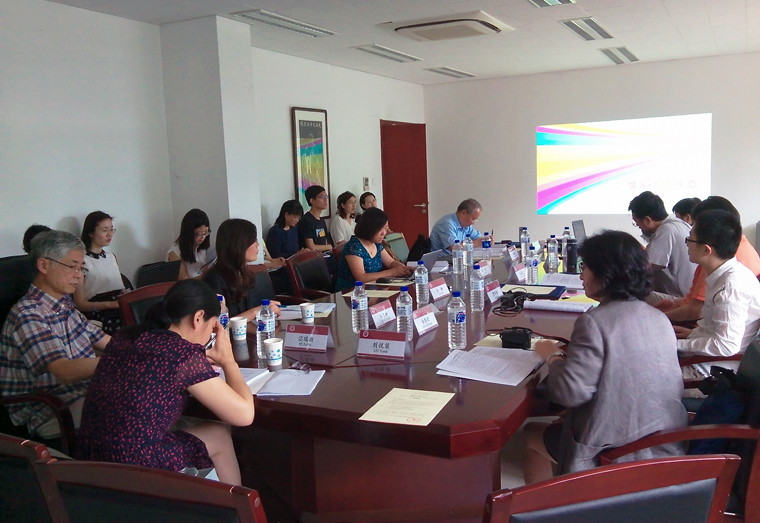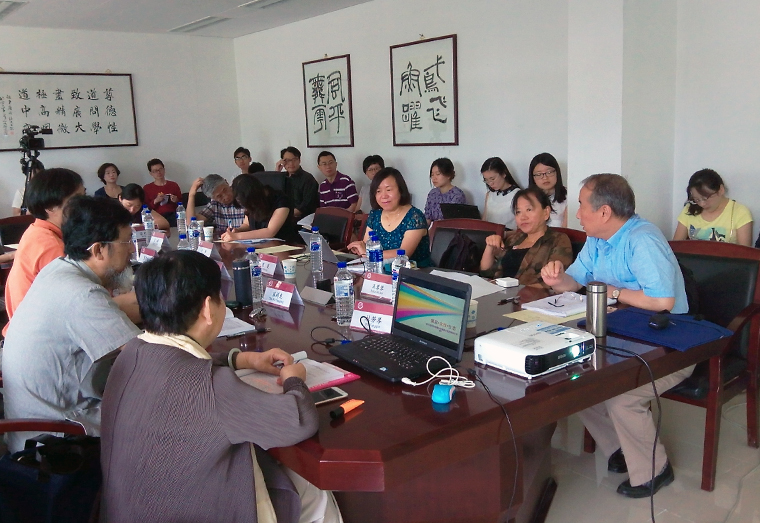



The Institute for Advanced Humanistic Studies (IAHS) held a Workshop on “Confucianism·Female·Ecology----How Confucian Feminist Ethics is Possible in Modern Multidimensional Contexts” from June 3 to June 4, 2017. More than 20 scholars participated in this workshop. During the 2-day workshop, participants of the workshop had in-depth discussions on several sub-themes, such as “Discourse and practice of Confucian feminist ethics”, “Gender, society and rule of law in modern contexts”, “Gender politics and ecological ethics in multidimensional perspective”, “Opportunities and challenges in front of Confucianism in its modern encounter with feminism.”
In the first session, Professor Du Fangqin offered in-depth critics to the views held by some Neo-Confucians such as Jiang Qing on hot topics like “The three cardinal guides” and “Finding a place for female.” Du argues that their views are expressions of fundamentalism, which is becoming an ideological system that oppresses female and the common people. Comparing modern and ancient ideas of “maintaining differentiation between men and women,” Professor Wu Genyou argued that only on the ground of identifying the natural differences between the sexes can equality between the sexes be better implemented. Based on the research on the marriage customs of Mosuo minority, Professor Zhang Xianglong compared the similarities and differences of the meaning of “father” between matrilineal families and patrilineal families. Professor Li Cunshan hosted and summarized this part of the discussion. Allying with Professor Tu, Li claimed that he had criticized “The three cardinal guides” for years and would continue his efforts on breaking “The three cardinal guides” to help the self-renewal of Confucianism.
In the second session, under the title of “How a Confucian female can be lovely,” Professor Robin Wang interpreted Biography of Women in Ancient China by Liu Xiang, and she unscrambled and reflected on the characteristics of Confucian feminist ethics. Zhang Lili retorted Judith Butler’s critical comments on Simone de Beauvoir’s gender theory, and through introducing the idea of “ongoing gender” from Hellmut Wilhelm, Zhang Lili proposed that gender construction is a dynamic process. Jia Peitao tracked the history of the conception of gender since the Post-reform era and presented the idea of “Invented traditional female and female traditions.”
The third and fourth sessions were devoted to explanations of feminist ethics from Confucian and Daoist perspectives, respectively. Professor Chen Xia explained the concept of freedom and nature in Daoism so as to clarify the theoretical foundation for female’s self-value identification. Dr. Liu Jing interpreted the concept of nature in Daoism, which she believed to be the mother of everything, characterized by the image of female’s non-striving and low-positioning attitude to life in contrast to the masculine attitude of subjugation and plunder. Through interpretation of metaphysics in Confucian female character, Dr. Xu Lan compared the theoretical origins of female’s gender construction from the angle of Confucianism. In the next session on “Confucian Feminist Ethics,” Professor Jin Huijing elaborated Li Zhi’s interactions with his female students, and combed through and criticized the improvement and historical limitations of Li Zhi’s view on women. Starting from criticizing Ming-Qing dynasties novels, Jiang Hanqi analyzed the impacts of the emerging new business ethics to feminist ethics. Dr. Wang Kun concluded the session with her presentation. Through comparing Zhu Xi’s view about morality of female and John Searle’s intentionality theory, Dr. Wang pointed out that female’s morality in Confucianism can be explained in the meta language based on Kun Dao (the way of the Yin), which implies a reversal of the popular impression that Zhu Xi’s view is oppressive to women.
The scholars had heated debates in the 2-day workshop, which provoked many deeper thoughts for the participants. Professor Wang Xiangxian’s research on “Paternal Responsibilities” since the China’s founding, Professor Yu Minmei’s analysis on “Boudoir Politics” in A Dream of Red Mansions, etc. all contributed to the stimulating discussion. The results of this workshop will be published in the forms of proceedings. It is anticipated that more and larger scale meetings will be held to promote the profound development of the communication between Confucianism and feminism.

Copyright@2014Institute for Advanced Humanistic Studies,PKU 京ICP备案1253235 Address: 4 Bldg,Lee Shau-kee Humanities,PKU,5 Yiheyuan Rd.,Haidian District,Beijing.